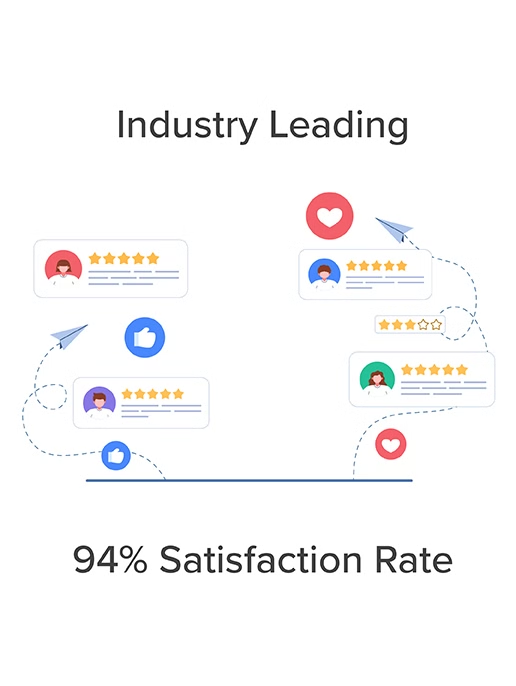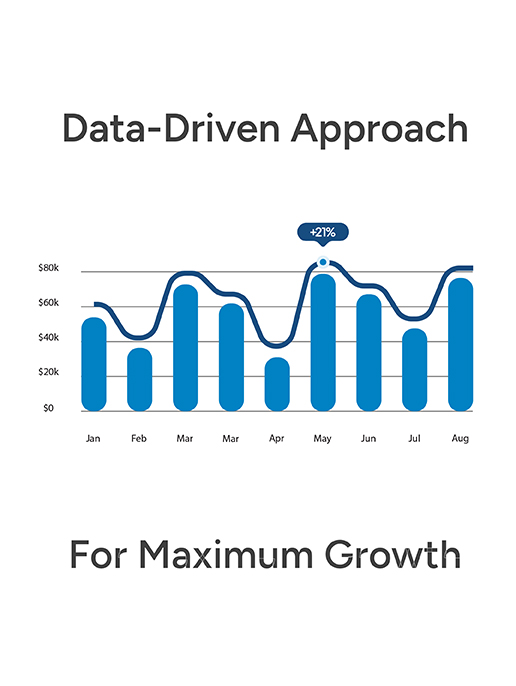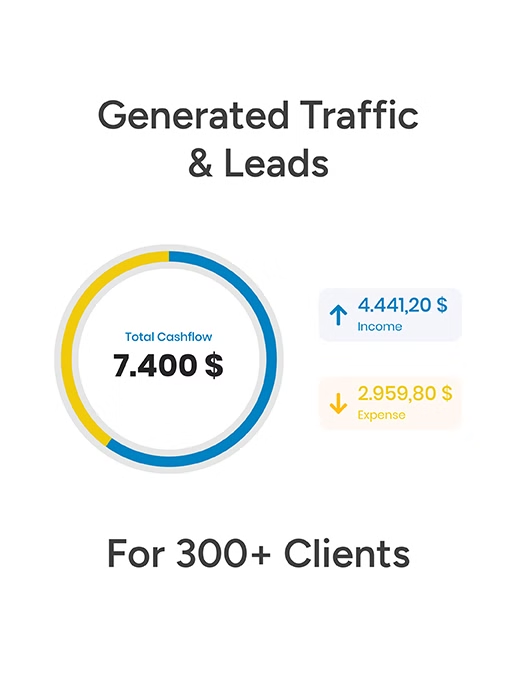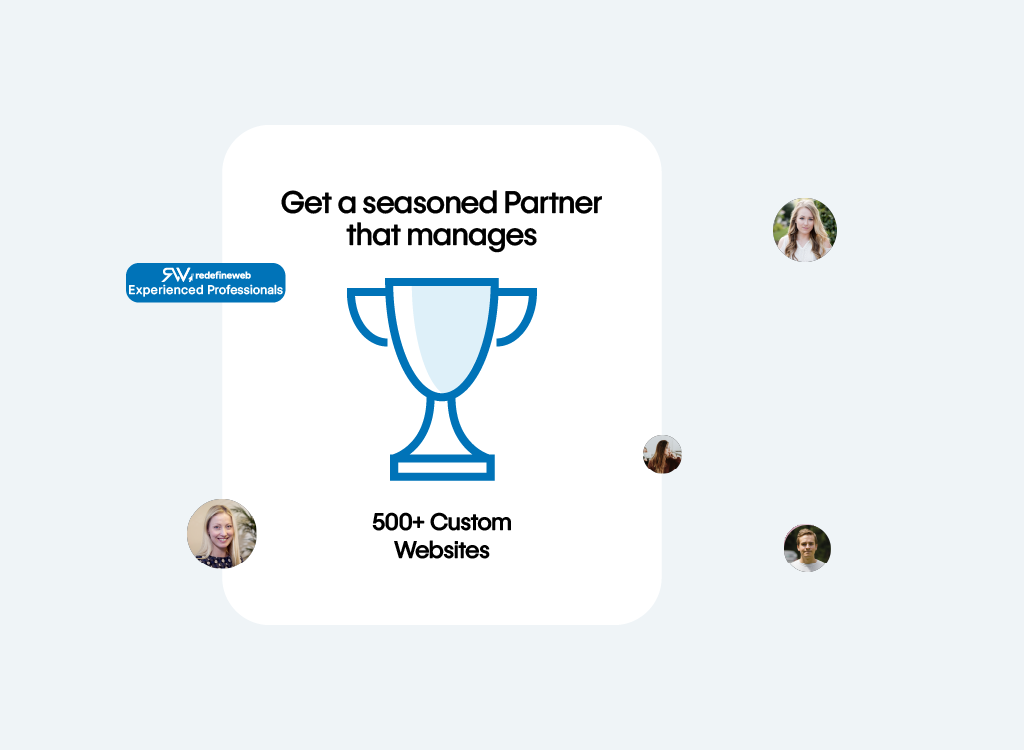


A professional web development firm can charge anywhere from $4,000 to $10,000 to build a website for your financial services business. For many firms, this can create significant budget challenges, limiting marketing investments and online visibility.
Instead, choose one of our financial services website packages and get started with a free starter website. Our plans are designed specifically for financial professionals—addressing industry-specific needs such as credibility, compliance, security, and client trust.
From elegant design and SEO to content creation and performance optimization, we take care of everything so you can focus on what matters most—serving your clients and growing your practice.

A professional and compliant website is essential for any financial services firm — whether you’re a financial advisor, accounting firm, insurance agency, or wealth management company. Yet, even the simplest website builder can’t provide the level of trust, security, and customization your clients expect.
At Redefine Web, we deliver all-inclusive solutions built specifically for the financial sector — covering everything from secure web design and development to SEO, content strategy, and digital marketing.
We take the time to understand your firm’s services, regulatory requirements, and target audience. This tailored approach helps you establish credibility, convert visitors into clients, and compete confidently in an increasingly digital financial landscape.
Financial professionals often struggle to find website solutions that balance professional design, regulatory compliance, and affordability. Many generic website packages come with hidden costs or fail to meet the unique needs of the financial industry.
Instead of spending valuable time comparing options, partner with our specialized financial services web design team to create a polished, trustworthy, and compliant website that builds confidence with your clients and attracts new prospects.
Every website we build is designed for growth. Need to add new calculators, integrate client portals, or expand with fresh service offerings? Simply contact us—our team will ensure every new feature aligns with your business goals and compliance requirements.

| Feature | Essential | Growth | Business | Custom |
|---|---|---|---|---|
| Design/Retainer Hours | 5 Hours (One-time) | |||
| Security Patches | ✓ | ✓ | ✓ | ✓ |
| Full-site backup | Monthly | Weekly | Weekly | ✓ |
| Security Scan | Monthly | Weekly | Weekly | ✓ |
| Server Migration | ✓ | ✓ | ✓ | ✓ |
| Copywriting | ✓ | ✓ | ✓ | ✓ |
| Keyword Research | ✓ | ✓ | ✓ | ✓ |
| Blog Posts | ✓ | 1 | 1 | 1 |
| Text Updates | ✓ | ✓ | ✓ | ✓ |
| On-page SEO | ✓ | ✓ | ✓ | ✓ |
| Photos Update | ✓ | ✓ | ✓ | ✓ |
| Off-page SEO |
| Feature | Essential | Growth | Business | Custom |
|---|---|---|---|---|
| Server Side Caching | ✓ | ✓ | ✓ | ✓ |
| HTTP Protocol | ✓ | ✓ | ✓ | ✓ |
| OpCache | ✓ | ✓ | ✓ | ✓ |
| Mod_Expires | ✓ | ✓ | ✓ | ✓ |
| Browser Cache | ✓ | ✓ | ✓ | ✓ |
| Brotli Compression | ✓ | ✓ | ✓ | ✓ |
| CDN | 82 POPs | 82 POPs | 82 POPs | 82 POPs |
| Feature | Essential | Growth | Business | Custom |
| Email Forwarders | ✓ | ✓ | ✓ | ✓ |
| Catch-all Emails | ✓ | ✓ | ✓ | ✓ |
| Email Aliases | ✓ | ✓ | ✓ | ✓ |
| IMAP/POP3/SMTP | ✓ | ✓ | ✓ | ✓ |
| Autoresponders | ✓ | ✓ | ✓ | ✓ |
| Filters | ✓ | ✓ | ✓ | ✓ |
| MX/SPF/DKIM Records | ✓ | ✓ | ✓ | ✓ |
| Email Virus Scanner | ✓ | ✓ | ✓ | ✓ |
| Feature | Essential | Growth | Business | Custom |
|---|---|---|---|---|
| Design/Retainer Hours | 5 Hours (One-time) | |||
| Security Patches | ✓ | ✓ | ✓ | ✓ |
| Full-site backup | Monthly | Weekly | Weekly | ✓ |
| Security Scan | Monthly | Weekly | Weekly | ✓ |
| Server Migration | ✓ | ✓ | ✓ | ✓ |
| Copywriting | ✓ | ✓ | ✓ | ✓ |
| Keyword Research | ✓ | ✓ | ✓ | ✓ |
| Blog Posts | ✓ | 1 | 1 | 1 |
| Text Updates | ✓ | ✓ | ✓ | ✓ |
| On-page SEO | ✓ | ✓ | ✓ | ✓ |
| Photos Update | ✓ | ✓ | ✓ | ✓ |
| Off-page SEO |
We often send out our newsletter with news and great offers. We will never disclose your data to third parties and you can unsubscribe from the newsletter at any time.
Unfortunately, we’re unable to offer free samples. As a retailer, we buy all magazines from their publishers at the regular trade price. However, you could contact the magazine’s publisher directly to ask if they can send you a free copy.
You can create a new account at the end of the order process or on the following page. You can view all of your orders and subscriptions in your customer account. You can also change your addresses and your password.
No, you don’t have to create an account. But there are a few advantages if you create an account.
You never have to enter your billing and shipping address again
Find all of your orders, subscriptions and addresses in your account
Download invoices of your orders
No, we don’t have a physical store location at the moment. We accept only orders through our online shop and we’re shipping all orders with the Swiss Post Service. Please visit our shipping section for more details.
From time to time you will find us at design fairs and popup markets in Switzerland. Subscribe to our newsletter and you’ll receive the latest news.
To deliver consistent, secure performance for every client, we include a soft traffic limit optimized for typical financial firms. If your site begins attracting larger audiences—a strong indicator your marketing is performing well—we’ll help you upgrade seamlessly to a plan with higher capacity, faster speeds, and additional tools to sustain your growth without interruption.
Each plan includes domain-based email addresses (e.g., contact@yourfirm.com, support@yourfirm.com) to give your communication a polished, trustworthy image. You’ll have dedicated inboxes for client inquiries, support, or operations—helping your team stay organized and maintaining the professionalism clients expect from a financial institution.
Your plan includes design hours dedicated to customizing your website for your brand and audience. During this time, our designers align your site’s visuals, layout, and messaging with your corporate identity, investment philosophy, and compliance requirements. Need unique landing pages or additional sections? You can easily add more design hours as your firm grows.
We use your included design hours to create a site that reflects your expertise and credibility. Our team adjusts colors, layout, and imagery to ensure your online presence feels professional, consistent, and trustworthy. These hours establish a strong starting point for your digital foundation, with the flexibility to scale and adjust as your business evolves.
Yes. If you’d like complete ownership of your website and prefer independent management of hosting or marketing, our buyout option puts you in full control. We’ll transfer all design files, content, and technical instructions—giving your firm the autonomy to manage your online presence on your own terms.
Most financial websites are ready in approximately 30 days, depending on how quickly we receive your brand assets and content. More advanced packages—such as those including interactive tools, calculators, or content integrations—may take a little longer. You’ll always know your delivery date before we begin.
We encourage you to share your firm’s messaging, team bios, and visuals. However, if you prefer a hands-free approach, our financial content specialists can write persuasive, compliant, SEO-optimized copy that builds client confidence and strengthens your visibility online.
Absolutely. Every financial firm has unique goals. Choose from targeted add-ons such as Local SEO optimization, Google Ads management, or custom landing pages focused on services like retirement planning, tax strategy, or wealth management. You can scale your site features anytime as your business expands.
We guarantee 99.9% uptime across all hosting plans. That means your site remains accessible and secure at all times—supported by SSL encryption, malware protection, and 24/7 performance monitoring. Clients will always find you online when they need you most.
Heat mapping reveals how visitors navigate your site—what they click, where they scroll, and which elements hold their attention. For financial firms, this data helps us pinpoint what engages potential clients (for example, contact forms or service descriptions) and refine your layout to maximize inquiries and conversions.
UX (User Experience) analysis identifies how easily visitors can find what they’re looking for, such as services, pricing, or consultation scheduling. We evaluate usability, readability, and navigation to improve engagement and conversion rates—creating a smoother, more professional experience for every prospect.
We focus on keeping your financial website fast, responsive, and secure. A high-speed site encourages visitors to stay and explore, boosts search engine performance, and builds trust. Our team continuously monitors and enhances code, structure, and performance so your website always delivers the best possible experience.
You’ll have a dedicated account manager and a secure online client portal for consistent communication. Expect regular project updates, support ticket tracking, and scheduled meetings to review marketing performance and campaign results. You’ll always know what’s happening—and what’s next.
Our complimentary Google Ads audit for financial professionals assesses how effectively your campaigns attract qualified leads and deliver ROI. Once we receive read-only access, we’ll:
WordPress optimization focuses on improving your financial website’s speed and performance—refining code, compressing images, and enabling caching to deliver a faster experience for visitors. This keeps potential clients engaged and encourages them to reach out.
Maintenance, on the other hand, ensures long-term reliability and protection. It includes regular updates, plugin and theme management, and security enhancements to keep your site stable, secure, and fully operational. In short, optimization makes your website perform better, while maintenance keeps it consistently dependable.
Our maintenance plans help your site run fast, secure, and consistently. We fine-tune technical elements, streamline data-heavy pages like service listings or client portals, and ensure quick load times on every device. We also manage all updates and monitor site health in real-time—so clients always experience a seamless, trustworthy interaction while you focus on running your business.
Core Web Vitals measure how quickly your site loads, how stable it appears while loading, and how responsive it is to user actions. Strong performance scores not only improve Google rankings but also build confidence with visitors—critical for a financial services brand. A fast, reliable website keeps prospects engaged longer and increases inquiries from clients who value professionalism and precision.
You’ll have direct access to our project management system for updates, tasks, and design reviews. Depending on your plan, a dedicated project manager will guide you through each phase and keep communication transparent. After launch, you can use your client portal for support and service adjustments. If you’ve added marketing services, you’ll also receive scheduled performance reviews to ensure your campaigns deliver measurable financial growth.
We treat security as a top priority. Every plan includes enterprise-level protection using CloudLinux and Imunify360, shielding your site from hacking, malware, and unauthorized access. We run regular vulnerability scans, secure contact forms, and use QUIC.Cloud’s CDN with DDoS protection. Our infrastructure is SOC- and GDPR-conscious—helping your firm stay compliant while protecting sensitive client data.
Yes. If you already have a site, our team will handle the entire migration for you. We safely transfer your content, data, and functionality to our optimized platform with minimal downtime. Once moved, your website will perform faster, operate more securely, and be easier to manage for your team.
Absolutely. Every website package includes automatic, off-site backups stored in secure data centers. In the rare event of an issue, we can restore your site quickly—so your firm remains accessible, compliance reports stay safe, and client communications continue without interruption.
We test every update in a secure staging environment before deployment, ensuring your financial website functions flawlessly, especially pages with data forms or resources. Once verified, updates and patches are applied seamlessly. Even our entry-tier plan includes continuous monitoring and proactive updates—so your website stays secure, stable, and high-performing.
No. Backup restoration is included with all financial website packages. If an update or technical issue occurs, we can restore your site quickly and at no additional cost—keeping your online presence reliable and your client experience uninterrupted.
Your website is safeguarded with multi-layer protection that includes firewalls, advanced malware scanning, and intrusion detection. We also integrate QUIC.Cloud’s CDN with Layer-7 DDoS protection for real-time defense against threats. Security updates are applied immediately upon release, keeping your site and client data safe around the clock.
Yes. Our SEO and PPC management services are built to help financial firms attract qualified clients actively searching for investment advice, tax planning, or wealth management solutions. A well-designed website establishes your credibility—SEO and PPC ensure the right audience finds you.
Our SEO approach focuses on ranking your firm for high-intent keywords such as “financial advisor in [city]” or “retirement planning services.” We handle keyword research, on-page optimization, and authority building. Because SEO builds long-term momentum, we often pair it with PPC for instant visibility at the top of search results. Together, these channels bring a consistent flow of new, high-quality leads to your business.
We start by understanding your firm’s goals, services, and target clients. Using industry-leading tools such as SEMrush and Google Keyword Planner, we identify profitable search terms like “fiduciary advisor in [city]” or “small business tax consultant.” Then, our SEO specialists and copywriters create clear, compliant, conversion-focused content that resonates with your audience. The result: higher visibility, more trust, and steady client inquiries.
We optimize every aspect of your website to help you rank higher and convert visitors effectively. From refining page titles, meta descriptions, and header tags to improving image alt text and linking structure, every detail is managed with purpose. Your site will load fast, be mobile-friendly, and comply with best practices—helping clients find financial services easily while search engines recognize your authority.
Our content team produces compliant, insight-driven copy that highlights your expertise and builds trust. We research your niche—whether it’s personal finance, insurance, or wealth management—to create pages that answer client questions and position your firm as an authority. Every piece is written with SEO precision to attract qualified traffic and drive consultation requests.
Yes. Local SEO is critical for financial advisors, accountants, and consultants who serve clients in specific regions. We optimize your Google Business Profile, correct local citations, and help gather client reviews that increase local trust. The outcome: your firm appears first when people search for nearby financial experts—meaning more calls, meetings, and long-term clients.
We believe in full transparency. You’ll receive regular, easy-to-understand reports covering keyword rankings, traffic growth, and lead inquiries. For PPC campaigns, we provide metrics on cost per lead, conversion rate, and return on ad spend. Your account manager reviews performance with you, discusses trends, and refines campaigns to continuously improve your results.
Our packages are flexible and custom-built around your firm’s size, goals, and growth targets. SEO plans can include keyword optimization, content development, local visibility management, and technical audits. PPC pricing is based on ad spend and campaign complexity—with complete transparency on where every dollar goes to drive measurable growth.
You can expect to start seeing results in 3–6 months, depending on your competition and current web presence. SEO is a strategic investment that compounds over time—as rankings and domain authority rise, lead volume grows steadily. Many clients experience lasting improvements in visibility and client acquisition long after initial campaigns are completed.
We build PPC campaigns around your highest-value services—such as retirement planning, business advisory, tax strategy, or investment management. Our team writes compliant, persuasive ad copy and tests variations for maximum ROI. Every ad is backed by data-driven targeting and continual optimization to ensure your budget brings in ready-to-convert leads.
We target according to location, income level, service interest, and other crucial demographics relevant to your audience. Our remarketing campaigns also re-engage visitors who previously viewed your services but didn’t inquire—keeping your brand top-of-mind as they evaluate financial options. With constant refinement, we lower acquisition costs while delivering better-quality prospects.
Getting started is simple. Choose one of our financial website packages and share your firm's details — logo, services, team information, and any preferences for design or messaging. Once we have your materials, our team handles everything from setup to launch, creating a secure, professional site that helps clients discover and contact you online. (If you’d like us to manage your copy, our SEO content writing service can craft compliant, client-focused messaging for each page.)
Yes. Each financial website we deliver includes an easy-to-use content management system. You or your team can quickly update service descriptions, add insights or market updates, upload team photos, or adjust text anytime—without needing technical skills.
Our hosting plans are secure, fast, and optimized specifically for financial professionals. However, if you prefer to manage hosting on your own, you can transfer your site at any time after a one-time buyout. We do recommend staying on our platform for maximum performance, data protection, and full technical support.
Absolutely. Your team can log in and upload new content such as financial articles, company updates, or team bios whenever needed. It’s simple to manage, and if you prefer a hands-free approach, our ongoing content service can handle updates and publishing for you.
Our hosting infrastructure is designed to scale with your business growth. The base plan comfortably supports the average traffic for small to mid-sized financial firms. As your marketing brings in more visitors, we’ll help you upgrade smoothly—ensuring your website stays fast, secure, and reliable even as your client base expands.
Yes. Every financial website we design is structured and optimized to perform well in search engines. We focus on technical SEO, mobile speed, and metadata best practices that help increase visibility for services such as tax planning, investment management, or insurance consulting. For maximum performance, our SEO add-on enhances your on-page strategy with keyword-driven content and ongoing optimization.
A design hour refers to the dedicated time our designers spend customizing your site’s layout, visuals, and branding. Our standard packages include several design hours to create a professional presence that aligns with your firm’s identity. Additional hours can be added for deeper customization or advanced features such as calculators, resource portals, or data integration.
Yes, you can provide your firm’s text, bios, and imagery—or we can take care of that for you. Our financial copywriting team creates compliant, SEO-friendly content that builds credibility, explains your expertise clearly, and encourages prospective clients to reach out.
Of course. Each financial firm has unique requirements. Whether you need additional pages, client portals, or custom integrations, we’ll prepare a personalized quote that fits your goals, timeline, and budget—all while ensuring your website supports both visibility and credibility.
Our managed hosting takes the technical burden off your shoulders so you can focus on serving clients and growing assets under management. You’ll have immediate access to over 500 professional templates, including designs tailored for financial advisors, accounting firms, and investment specialists.
Each plan includes four hours of expert design time to personalize your site with your logo, brand colors, and core message—so you can go live faster and look credible from day one. You’ll also receive five branded email accounts, daily off-site backups, and 24/7 server monitoring. We take care of performance, updates, and cybersecurity, giving you a strong, worry-free online foundation your clients can trust.
When your firm grows and site traffic increases, your hosting scales with you automatically. Once your website exceeds 10,000 monthly visits, we’ll upgrade you with zero downtime. You can easily add services like financial content writing, SEO-optimized blog strategy, or compliance-friendly newsletter management to keep your growth momentum strong.
Whether you’re adding team members, opening new offices, or expanding your client list, our hosting keeps your website running fast and smoothly at every stage.
Security is mission-critical for financial firms. Our hosting runs on enterprise-grade servers with advanced firewalls, intrusion prevention, and daily system updates that align with financial data protection standards. We provide real-time monitoring and daily off-site backups, ensuring your website and client data remain protected, compliant, and restorable—whenever needed.
Yes. We’ll migrate your existing financial website with no data loss and minimal downtime. Our team handles all technical details—preserving your pages, content, and SEO performance while improving speed, reliability, and security. You’ll notice better load times and consistent uptime from the moment we complete the move.
If your traffic surpasses 10,000 monthly visits, we’ll notify you to upgrade before any impact occurs. The process is completely seamless, preserving your site speed and uptime. Traffic surges or campaign spikes won’t trigger surprise fees—your hosting adapts to keep your firm visible and responsive as you attract more investors and leads.
Our data centers are strategically based across North America and Europe. We’ll host your financial website in the location closest to your primary market, resulting in faster site load times, smoother user experiences, and better search visibility for potential clients in your region.
Yes. Every financial business has unique hosting requirements. Whether you need extra storage for client documents, faster performance, or advanced compliance features, we’ll customize your plan to fit your goals. As your firm evolves, your hosting scales easily—so your online presence always stays secure, professional, and efficient.
Yes. If you already have a financial website designed elsewhere, we can host it. You’ll benefit from fast load speeds, daily backups, continuous uptime monitoring, and enhanced cybersecurity—all handled by our expert technical support team. It’s the ideal option for firms that want reliable hosting without additional design services.
Since we’ve discontinued all free plans, export options are available for all paying customers. Monthly subscribers can export after one year, while annual plan clients can export any time with our team’s assistance. We’ll ensure the transfer is executed smoothly, avoiding downtime and keeping your site fully accessible throughout the process.
Buyout fees vary depending on how much customization and development work has been completed on your financial site. We provide a clear, upfront quote—no hidden costs—so you can make a confident decision. Our goal is to give your firm full control and flexibility whenever you’re ready to take ownership.
